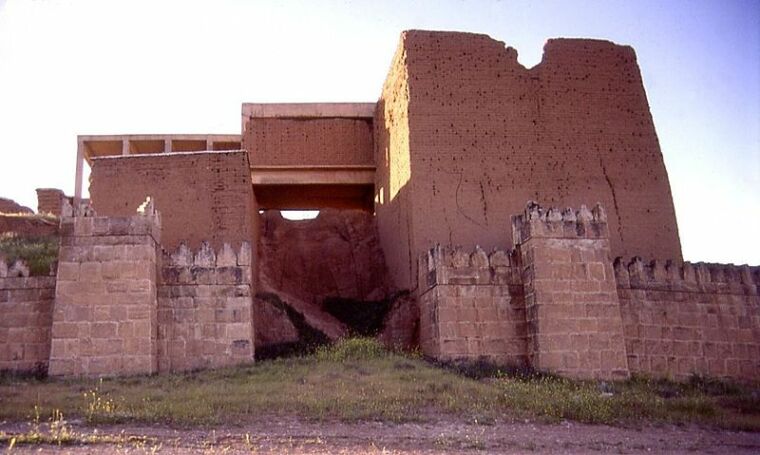ISIS destroys ancient Assyrian Gate of God

The Islamic State has reportedly destroyed yet another archeological treasure, a seventh-century BC structure that once stood as a gate to the ancient Assyrian city of Ninevah, but details have yet to be known.
"We continue to follow the latest news reports from Iraq," a British Museum spokesperson told The Independent. "We naturally deplore all acts of vandalism and destruction of cultural heritage, and continue to monitor the situation to the best of our ability. In the absence of specific information it is not yet possible to comment on what has been destroyed."
ARA News received information from activists that IS used military equipment to do damage to the 2,000-year-old Mashqi Gate, also called the Gate of God, which stood since the time of Assyrian king Sennacherib.
A source from the British Institute for the Study of Iraq also told The Independent that the gate was attacked, something that The Antiquities Department in Baghdad reportedly did not deny. The source also said that there are unconfirmed reports of the stone blocks from the Wall of Nineveh being dismantled and sold.
The structure is situated near Mosul, a city in Iraq that has seen a lot of damage done in the hands of the terror group since they took over in 2014. Among the heritage sites in the area that were reported to have been destroyed are the 12th century Khudr Mosque, the 13th-century shrine of Imam Awn al-Din, the 1,400-year-old Dair Mar Elia (Saint Elijah) monastery, the 10th-century Chaldean Catholic St Markourkas Church, the 7th-century Green Church (St Ahoadamah Church), the 13th-century Assysrian city of Nimrud, among others. According to The Independent, IS militants also vandalized and ruined ancient statues at the Mosul Museum including the the 7th-century BC Winged Bulls, burned more than 100,000 old books and manuscripts from the city library, and turned the University of Mosul into a factory for bombs and a training ground for recruits.
Nineveh has a long history, with people settling in as far back as 6,000 BC -- the city was mentioned in the Bible as early as chapter 10 of Genesis -- but it bloomed around 700 BC during the time of King Sennacherib.
 Christians don't have to affirm transgenderism, but they can’t express that view at work: tribunal
Christians don't have to affirm transgenderism, but they can’t express that view at work: tribunal Archaeology discovery: Medieval Christian prayer beads found on Holy Island
Archaeology discovery: Medieval Christian prayer beads found on Holy Island Presbyterian Church in America votes to leave National Association of Evangelicals
Presbyterian Church in America votes to leave National Association of Evangelicals Over 50 killed in 'vile and satanic' attack at Nigerian church on Pentecost Sunday
Over 50 killed in 'vile and satanic' attack at Nigerian church on Pentecost Sunday Ukrainian Orthodox Church severs ties with Moscow over Patriarch Kirill's support for Putin's war
Ukrainian Orthodox Church severs ties with Moscow over Patriarch Kirill's support for Putin's war Islamic State kills 20 Nigerian Christians as revenge for US airstrike
Islamic State kills 20 Nigerian Christians as revenge for US airstrike Man who served 33 years in prison for murder leads inmates to Christ
Man who served 33 years in prison for murder leads inmates to Christ


 Nigerian student beaten to death, body burned over ‘blasphemous’ WhatsApp message
Nigerian student beaten to death, body burned over ‘blasphemous’ WhatsApp message 'A new low': World reacts after Hong Kong arrests 90-year-old Cardinal Joseph Zen
'A new low': World reacts after Hong Kong arrests 90-year-old Cardinal Joseph Zen Iran sentences Christian man to 10 years in prison for hosting house church worship gathering
Iran sentences Christian man to 10 years in prison for hosting house church worship gathering French Guyana: Pastor shot dead, church set on fire after meeting delegation of Evangelicals
French Guyana: Pastor shot dead, church set on fire after meeting delegation of Evangelicals ‘Talking Jesus’ report finds only 6% of UK adults identify as practicing Christians
‘Talking Jesus’ report finds only 6% of UK adults identify as practicing Christians Mission Eurasia ministry center blown up in Ukraine, hundreds of Bibles destroyed: 'God will provide'
Mission Eurasia ministry center blown up in Ukraine, hundreds of Bibles destroyed: 'God will provide' Church holds service for first time after ISIS desecrated it 8 years ago
Church holds service for first time after ISIS desecrated it 8 years ago Burger King apologizes for 'offensive campaign' using Jesus' words at the Last Supper
Burger King apologizes for 'offensive campaign' using Jesus' words at the Last Supper Uganda: Muslims abduct teacher, burn him inside mosque for praying in Christ’s name
Uganda: Muslims abduct teacher, burn him inside mosque for praying in Christ’s name